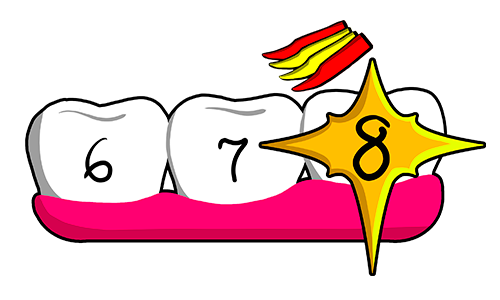Here is a non-exhaustive list of sources that back my philosophy towards wisdom teeth:
Guidance on the extraction of wisdom teeth,
by the British National Institute of Health and Care Excellence (NICE)
by the British National Institute of Health and Care Excellence (NICE)
The practice of prophylactic removal of pathology-free impacted third molars should be discontinued in the NHS. Surgical removal of impacted third molars should be limited to patients with evidence of pathology (...).
Direct and clear as a bell. These guidelines are from the year 2000, but perfectly up to date. The NICE has acknowledged criticism and left its minimally invasive position unchanged, as you can consult here.
Opposition to Prophylactic Removal of Third Molars (Wisdom Teeth),
by the American Public Health Association (APHA)
by the American Public Health Association (APHA)
Most wisdom teeth erupt, and only a small percentage of those that remain unerupted or partially erupted cause problems that warrant extraction (... ). The APHA opposes prophylactic removal of third molars, which subjects individuals and society to unnecessary costs, avoidable morbidity, and the risks of permanent injury (... ).
Removal of 3rd molars: indications, techniques and modalities,
by the French High Health Authority (HAS) (in French)
by the French High Health Authority (HAS) (in French)
Translated: The removal of a 3rd molar is not recommended to prevent anterior crowding (... ). Inclusion and/or ectopy are not criteria in the therapeutic decision. Only the "symptomatic" and/or "pathological" characteristics of the 3rd molar are retained as criteria in the therapeutic decision.
I can only wish more of my colleagues in France would listen to these wise recommendations!
Prophylactic removal of pathology-free wisdom teeth: rapid assessment,
by the Belgian Health Care Knowledge Centre
by the Belgian Health Care Knowledge Centre
There is mostly little debate on the fact that third molars associated with clinical and/or radiological pathology, such as unrestorable caries, should be removed. However, there is a lack of proven benefit from the systematic prophylactic removal of pathology-free third molars (... ). If there is no scientific evidence that an intervention is beneficial, the largely accepted principle of medicine: "primum non nocere", "first, do no harm", should be respected.
The role of mandibular third molars on lower anterior teeth crowding and relapse after orthodontic treatment: a systematic review,
paper by Zawawi KH and Melis M
paper by Zawawi KH and Melis M
Conclusion: (... ) most of the studies do not support a cause-and-effect relationship; therefore, third molar extraction to prevent anterior tooth crowding or postorthodontic relapse is not justified.
Diagnosis and indications for the extraction of third molars,
by the Spanish Society of Oral Surgery (SECIB), in Spanish
by the Spanish Society of Oral Surgery (SECIB), in Spanish
Translated: The extraction of the 3rd molars to prevent, limit or resolve the degree of anterior-inferior dental crowding is not justified, since the available evidence indicates that there is no cause–effect relationship (... ).
I am proud of my paisanos for coming up with these wise recommendations.
Clinical guidelines,
by the Spanish Dental Foundation (FDE), in Spanish
by the Spanish Dental Foundation (FDE), in Spanish
Translated: Patient preferences should be considered together with clinical experience to guide decision-making in a consensual manner.
Surgical removal versus retention for the management of asymptomatic disease-free impacted wisdom teeth,
a Cochrane review
a Cochrane review
Authors' conclusions: Insufficient evidence is available to determine whether asymptomatic disease-free impacted wisdom teeth should be removed or retained. (... ) Patient values should be considered and clinical expertise used to guide shared decision-making with people who have asymptomatic disease-free impacted wisdom teeth.
Older version of the Cochrane review
Watchful monitoring of asymptomatic third molar teeth may be a more prudent strategy [than removal].
Evidence Is Mounting That Routine Wisdom Teeth Removal Is a Waste of Time,
by Fiona MacDonald
by Fiona MacDonald
A very well written and referenced educational article on the issue of excessive wisdom teeth removals.
The Prophylactic Extraction of Third Molars: A Public Health hazard,
by Jay W. Friedman
by Jay W. Friedman
A wonderful opinion article by Jay W. Friedman, an experienced dentist from California. He addressed many of the points I cover on this website. He talks mostly about the situation in the United States of America. Even if this article is rather old (published in 2007), the points it brings up are still perfectly valid and relevant. I see it every day at my job, and when interacting with online followers (many of them from the USA).
Splendid talk at the National Oral Health Conference (2012),
by Jay W. Friedman
by Jay W. Friedman
The PPT he presented is available here.
Asaf Cygelberg's personal website
Asaf Cygelberg is an independent researcher from Israel that I am in touch with. He has conducted polls to get epidemiological data on wisdom teeth, has analyzed the anatomical relationships of third molars with other structures, and has developed and exposed a few theories about side effects of the removal of third molars. You can also visit his personal website here.
I will close this bibliography section with a Spanish proverb that feels very relevant: El saber no ocupa lugar. Meaning: Knowledge takes no place.
Never stop learning, reading and discovering!
Saludos cordales.
Saludos cordales.
